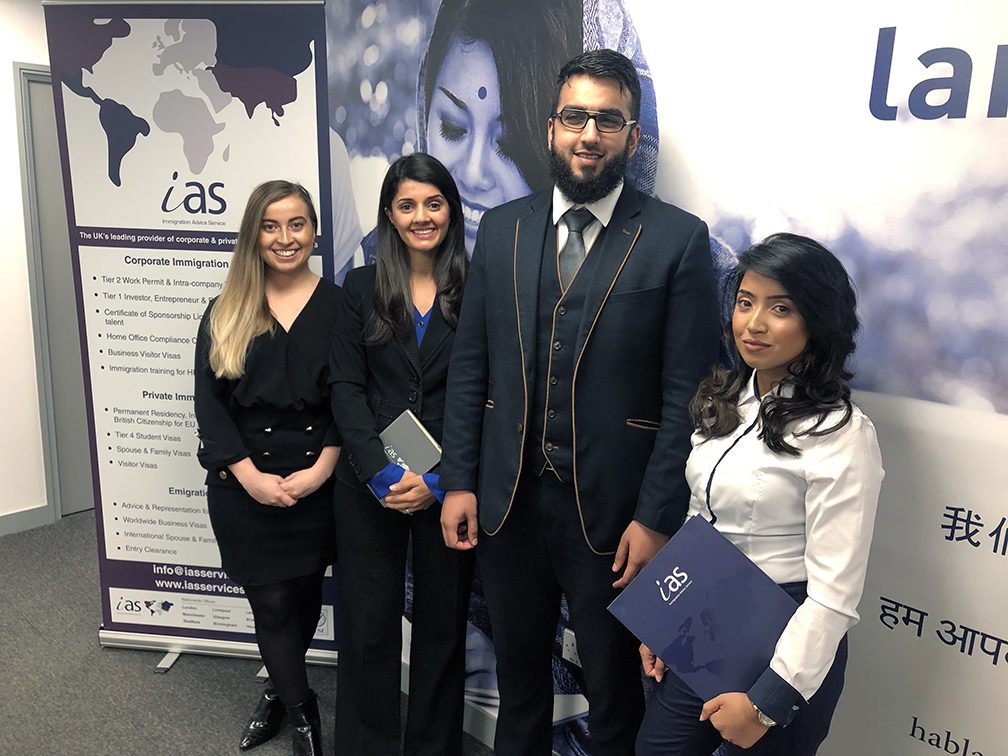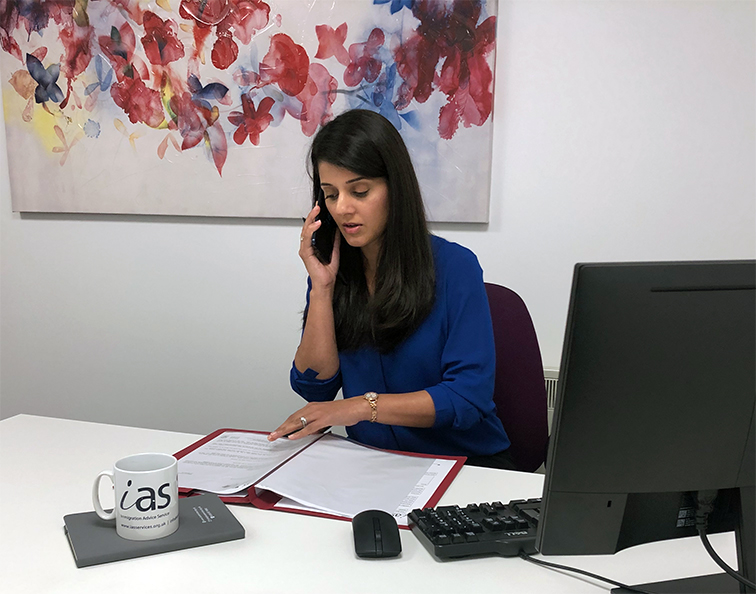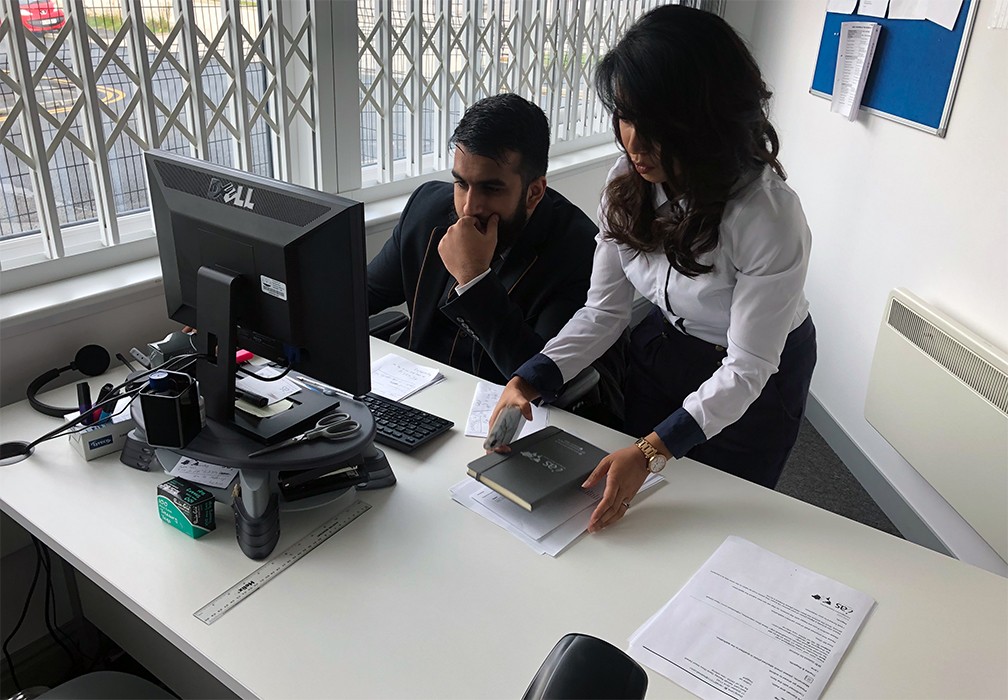General Employment Permit Ireland
If you are from a country outside of the European Economic Area (EEA), the UK, or Switzerland, you will require permission in order to work in Ireland. This permission will normally take the form of a work permit. If you are a US citizen looking to work in Ireland, you may be eligible for a general employment permit.
For more information about the general employment permit, including further details on eligibility, the application process, and receiving bespoke advice on the process of moving to Ireland, reach out to one of our Total Law immigration advisors. You can do so either online or by calling us at +1 844 290 6312.
Overview of the General Employment Permit
For those who are from a country outside of the EEA, the UK, or Switzerland, you will generally require a work permit in order to work in Ireland. US citizens will therefore need to apply for a work permit before they can lawfully work in Ireland. One of these employment permits is the general employment permit, for which you may be eligible to apply.
The general employment permit was introduced in order to provide workers for jobs where there is currently a shortage of labor in Ireland. These permits can be granted for all jobs which are not excluded on the Ineligible List of Occupations for Employment Permits, assuming that all other eligibility criteria are met by the permit applicant.
The application for the permit must generally be made at least 12 weeks before the provisional start date of the employment.
Page Contents
- Overview of the General Employment Permit
- What are the eligibility criteria for the General Employment Permit?
- Employer eligibility criteria
- Application Process for General Work Permit
- General Employment Permit Application Fees
- General Work Permit Processing Times
- General Employment Permit duration and renewal
- Changing Employer
- How can Total Law help?
- Frequently Asked Questions
What are the eligibility criteria for the General Employment Permit?
In order to be eligible to apply for the general employment permit, the occupation in question must not be named in the Ineligible List of Occupations for Employment Permits, as mentioned earlier in this article. You must also satisfy the skills, qualifications, and experience requirements of the job; an applicant who lacks the qualifications for the jobs at hand will not be considered eligible for the permit. Finally, your minimum salary must generally be €34,000 a year. However, there are some exceptions in which lower salaries are considered eligible:
- You can also apply if your annual salary is €30,000 and you are offered a job as a meat processing operative or a horticultural operative.
- You can apply if your annual salary is €27,000 and you are offered a job as a healthcare assistant (you must have a Level 5 QQI qualification or a relevant health and social care qualification comparable to a Level 5 QQI, or get one within 2 years of starting your job), or offered a job as a home carer (you must have a Level 5 QQI qualification, or get one within 2 years of starting your job).
For more information on these exceptions, contact Total Law today online or at +1 844 290 6312.

Employer eligibility criteria
Overview
There are also eligibility requirements which your employer must meet. The potential employer must trade in Ireland and be registered with both Revenue and with the Companies Registration Office.
The employer must also have carried out a Labor Market Needs Test (which is discussed below) and satisfy the 50:50 rule (according to which more than 50% of the workers currently employed by the company must be from an EEA country- this is also discussed below).
Labor Market Needs Test
When looking to fill a position, a company must give priority to workers from Ireland and the EEA. Because of this, when filling a vacancy, an employer can only hire a worker using a general employment permit if they have first attempted to fill the role using either an EEA or Irish citizen. A general employment permit holder may be used when the labor market in the EEA and Ireland is unable to fill the role. Only when the company has made a reasonable attempt to fill the role in this way can they hire a worker with a work permit.
In order to satisfy the Labor Market Needs Test, the company must advertise for the vacancy in the following three ways:
- The Department of Social Protection (DSP) and European Employment Services (EURES). The employer must advertise the position for at least 4 weeks
- A national newspaper. The employer must advertise the position for at least 3 days.
- A local newspaper or job-listing website. The employer must advertise the position for at least 3 days
When completing general employment permit applications, you must prove that the Labor Market Needs Test has been carried out.
However, there are some exceptions to this rule. You may be granted such an exception in the following circumstances:
- If the job is listed on the Critical Skills Occupations List.
- If the job has an annual minimum salary of €64,000. Note that, in this case, the applicant must still satisfy the other eligibility criteria.
- If Enterprise Ireland or IDA Ireland has made a recommendation regarding the job offer in question (note that this is only applicable when the job is with a client company of Enterprise Ireland or IDA Ireland).
- If the job offer is for a Carer of a person with exceptional medical needs. In order to qualify for this exception, you must already have been providing care to that person before applying for the new work permit, with this previous care leading them to develop a high level of dependence on you.
- If you already have a General Employment Permit or a Work Permit Employment Permit and were made redundant in the last six months (note that this only applies in cases where the Department of Enterprise, Trade and Employment was made aware of the redundancy within 4 weeks of the date when you were dismissed).
50:50 Rule
In order for your employer to be eligible to hire employees with a general employment permit, they must first satisfy the 50:50 rule. The 50:50 rule states that, at the time when you apply for a work permit, at least 50% of the employees of the company for which you plan to work must be EEA nationals. However, there are some exceptions to this rule, including:
- Where the role is with a start up company (where the company registered with Revenue in the past two years)
- Where the employer has no employees at the point at which the application is being made, and where you, if successful in your application, will be the employer’s sole employee (note that this will also apply in the case of renewal, assuming that you remain the sole employee of the company).

Application Process for General Work Permit
As already noted, the application for a General Employment Permit must be received at least 12 weeks before the preliminary start date for the role. You can make the application online using the employment permit online system (EPOS). When applying for the permit, you will need to include the details of your prospective employer, your own details, the details of employment, and how much you will be paid. You will also need to specify who will be paying for the permit and to include their payment details. Additionally, you will need to provide proof that the Labor Market Needs Test has been carried out by your prospective employer.
There are 3 stages which follow once the application has been submitted:
- Application received (awaiting processing): Your application will be placed in a queue. The queue into which it is placed depends on the type of employer in question. Applications are processed in order of receipt.
- Processing stage: Your application will now be considered by a decision-making official. During this stage, more information may be requested by the decision maker. The decision maker will then decide whether or not the permit will be granted.
- Review: If you wish to appeal a refused application, you may do so within 28 days of the refusal, at which point the decision passes to a new official. The new official will be someone who is more senior than the previous decision maker.
Note that, in the event that the refusal is confirmed by the reviewer, you will still be able to submit a new application for a work permit, assuming that you satisfy all of the eligibility criteria.
General Employment Permit Application Fees
The application includes a processing fee: a fee of €500 if the permit is for an employment period of 6 months or less and €1,000 if the permit is for an employment period of 6 to 24 months. The processing fee for renewing a permit is slightly higher: €750 if the employment period is 6 months or less and €1,500 if the employment period is 6 to 36 months long.
In the event that your application is withdrawn or unsuccessful, you will be refunded 90% of the fee.

General Work Permit Processing Times
The current processing time for an Irish work visa is approximately 8 weeks. However, this amount of time may vary depending on the current number of applications being processed. Note that applications can be delayed if not submitted properly, for instance if necessary documents or information are missing.
As noted above, the decision-making official may reach out to you for more information during the processing stage of your application. If this happens, make sure to provide this information within 28 days.
General Employment Permit duration and renewal
An individual work permit may be granted for up to 2 years. However, the permit may be renewed by a further 3 years, after which point it is assumed that you will apply for permanent residency in Ireland. A renewal request can be submitted up to 4 months before and 1 month after the expiry of your current work permit.
Once you have held a work permit for 5 years, you may be eligible to apply for long-term residency in Ireland, assuming that you have been working lawfully for the duration of that 5 year period. If you wish to apply for permanent residency, you should contact the Department of Justice and Equality.
Changing Employer
Overview
If it is your first time holding a work permit in Ireland, you will be required to stay with your employer for one year (except in certain circumstances, which are outlined in the next paragraph). After one year, you can make a new general employment permit application with a different employer. Upon successful receipt of a new work permit, you are then permitted to change employer.
Where first-time permit holders must otherwise stay with their employer for a minimum of one year, the Department of Enterprise, Trade and Employment may grant an exception to this rule in instances where one of the following applies: you are a medical doctor who is on 6 month rotations, there is an (unforeseen) change of circumstances which significantly changes your relationship with the employer, or you lose your job.
Losing your job
If the change in employment is due to being made redundant, you are eligible to start working for a new employer. Within 28 days of losing your job, you must notify the Department of Enterprise, Trade and Employment of the change in circumstances. Afterwards, you will have 6 months to secure new employment. In searching for a new job, you will now be allowed to take a role in one of the ineligible occupation categories discussed earlier.
However, in the absence of one of these exceptional circumstances, first-time work visa holders will be required to stay with their employer for the first 12 months.
How can Total Law help?
Irish general employment permits are one of the most common routes used by US citizens who are looking to work in Ireland. But applying for a general employment permit can be complex, as it involves numerous steps and eligibility criteria.
If you’re a US citizen hoping to secure an Irish work permit, Total Law can help. We are an experienced team of immigration specialists who are ready to help you find the option which is right for you. We are able to assist you with every stage of the application.
We can also assist you with assessing your eligibility for the other categories of Irish work permit and help you work on other permit applications.
For more information about Ireland’s general employment and other types of work permit, as well as bespoke immigration advice, reach out to us today at +1 844 290 6312 or contact us online.
Advice Package
Comprehensive immigration advice tailored to your circumstances and goals.
Application Package
Designed to make your visa application as smooth and stress-free as possible.
Fast Track Package
Premium application service that ensures your visa application is submitted to meet your deadline.
Appeal Package
Ensure you have the greatest chance of a successful appeal. We will represent you in any case.

The Advice Package
During this untimed Advice Session with our professional immigration lawyers in London, you will receive our comprehensive advice, completely tailored to your needs and your situation.

The Application Package
With our Application Package, your dedicated immigration lawyer will advise you on your application process and eligibility. Your caseworker will then complete and submit your forms to the Home Office on your behalf.

The Fast Track Package
Our Fast-Track Application Package is a premium service for those who need to submit their application in time with their deadlines. Your case will become a top priority for our lawyers and you will benefit from our highest-quality services.

The Appeal Package
By choosing our Appeal Package, you can rely on our lawyers’ legal knowledge and experience to ensure you have the highest chance of a successful appeal. We will also fully represent you in any hearings/tribunals.
Related pages for your continued reading.
Frequently Asked Questions
Ireland has nine types of work permit. These are:
- General Employment Permit
- Critical Skills Employment Permit
- Dependant/Partner/Spouse Employment Permit
- Intra-Company Transfer Employment Permit
- Contract for Services Employment Permit
- Reactivation Employment Permit
- Internship Employment Permit
- Sport and Cultural Employment Permit
- Exchange Agreement Employment Permit
As a US citizen, you may be eligible for a number of these permits. Contact Total Law directly online or at +1 844 290 6312 to find out from one of our immigration advisors which of these permits is right for you.
US citizens do not require a visa to enter Ireland. They may enter Ireland for up to 90 days for visa-free travel.
You can find more information on US passport entry requirements here. Visas will be required for nationals of certain countries, however. More details on this can be found here.
If you are a US citizen and you wish to stay in the country for longer than 90 days, you will require a visa.
It is important to note that entry into Ireland is at the discretion of the immigration authorities at the point of entry. It is recommended that you renew passports which are close to expiring before the start of your trip.
Once you have been in Ireland on a General Employment permit for one year, your family will be able to apply to join you. You will need to prove that your salary is sufficient to support them. If your family are citizens of a country which requires visas in order to enter Ireland, each member of your family must apply for a separate visa. If they do not need a visa to enter, they will still need to prove that they have a family member who is a holder of a General Employment Permit, when entering Ireland.
As a US citizen, you are eligible to work in Ireland if you have permission to do so in the form of a work permit. Citizens of countries which are neither a member of the EEA nor the UK or Switzerland must first obtain a work permit in order to work in Ireland. There are 9 types of work permit in Ireland, listed earlier in these FAQs.
Generally, you must apply for the general employment permit before you arrive in Ireland. However, if you are already living in Ireland and have a valid Irish Residence Permit with Stamp 1, 1G, 2, 2A or 3, you will not need to leave Ireland in order to apply for the permit.
Note that, if you are a Stamp 4 holder, you do not require a work permit in order to legally work in Ireland. However, if your stamp is close to expiring and is not eligible for renewal then you should apply for a work permit if you wish to work in Ireland.
US citizens who are in Ireland without a visa, having entered visa-free for up to 90 days of travel, are not eligible to work in Ireland.
After Brexit, citizens of the EEA, Switzerland, and the UK still do not require a work permit in order to work in Ireland. However, US citizens will still require a work visa.
Whilst processing times vary, a response will generally be given within 28 days. Applicants can also track the current processing timings online.

